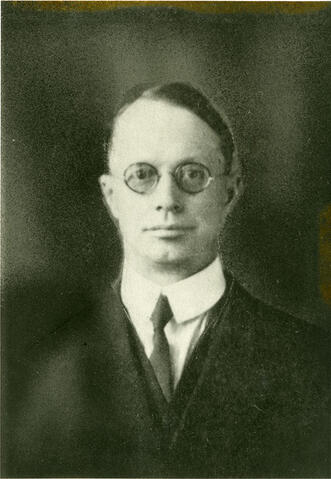
Zona do título e menção de responsabilidade
Título próprio
Dr. Samuel E. Greenway - Portrait
Designação geral do material
- Material gráfico
Título paralelo
Outra informação do título
Título e menções de responsabilidade
Notas ao título
Nível de descrição
Item
Entidade detentora
Código de referência
Zona de edição
Menção de edição
Menção de responsabilidade da edição
Zona de detalhes específicos de materiais
Menção da escala (cartográfica)
Menção da projecção (cartográfica)
Menção das coordenadas (cartográfico)
Menção da escala (arquitectura)
Autoridade emissora e denominação (filatélica)
Zona de datas de criação
Data(s)
-
[before 1919] (Produção)
Zona de descrição física
Descrição física
1 photograph : b&w ; 12.5 x 18 cm
Zona dos editores das publicações
Título próprio do recurso continuado
Títulos paralelos das publicações do editor
Outra informação do título das publicações do editor
Menção de responsabilidade relativa ao editor do recurso contínuo
Numeração das publicações do editor
Nota sobre as publicações do editor
Zona da descrição do arquivo
Nome do produtor
História custodial
Âmbito e conteúdo
Head and shoulders portrait of Dr. Samuel Earl Greenway, Director of Extension.
Bio/Historical Note: Dr. Samuel Earl Greenway was born 16 February 1875 in Little Prairie, Wisconsin. He settled in Manitoba in 1880, and was in turn a farmer, teacher, telegraph operator, and reporter, editor and contributor to magazines. Dr. Greenway was involved in a pivotal event in the history of the University of Saskatchewan, known as “the University crisis of 1919.” The matter became public on June 28 when the Saskatoon Star announced that four members of faculty had been fired without explanation. They were: Samuel E. Greenway, director of Extension; Robert D. McLaurin; head of Chemistry; Ira A. MacKay, professor of Law; and John L. Hogg, head of Physics. All were senior members of faculty with many years of experience. The affair had started in March of that year when Greenway had accused Walter C. Murray, University President, of falsifying a report about University finances. This complaint had been made to the government and not to the Board of Governors. In early April Council voted 27 to zero “affirming its confidence and loyalty to the President” while four members abstained. Three of those who abstained plus Greenway were dismissed as the Board put it, “in the best interest of the University.” The public and the press clamoured for an explanation. When one was not forthcoming, calls for a public inquiry were loud and persistent. In accordance with the University Act, the Lieutenant Governor assumed the role of Visitor and through the office of the King’s Bench held a series of hearings. The Visitor’s report was delivered in April 1920 and vindicated the Board’s decision saying it was “regular, proper and in the best interest of the university.” The professors were not protected by tenure but were employed “at the pleasure of the board.” Their act of disloyalty was enough to cost them their jobs.
Zona das notas
Condição física
Fonte imediata de aquisição
Organização
Idioma do material
Script do material
Localização de originais
Disponibilidade de outros formatos
Restrições de acesso
Termos que regulam o uso, reprodução e publicação
Photographer: Unknown
Copyright holder: Public domain
Other terms: Responsibility regarding questions of copyright that may arise in the use of any images is assumed by the researcher.

